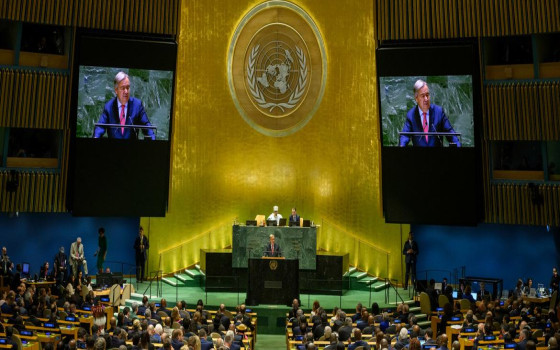
With the approval of 193 countries, a resolution supporting the Secretary-General's initiative to strengthen and streamline the United Nations system has drawn mixed reactions regarding the timing and demands that it be transparent, inclusive, and address duplication of efforts.

- Europe and Arabs
- Saturday , 19 July 2025 11:50 AM GMT
New York: Europe and Arabs
The United Nations General Assembly unanimously adopted a resolution on Friday endorsing the Secretary-General's "UN 80" initiative, which aims to strengthen and streamline the United Nations system. According to the UN Daily News Bulletin, a copy of which we received on Saturday morning, the resolution—which was presented by Russia and adopted without a vote—“welcomes the Secretary-General’s efforts to strengthen the United Nations to keep pace with the changes taking place in our world” and calls on UN entities and specialized agencies to align their reform efforts “as appropriate.”
In the resolution, the 193-member General Assembly recognizes “the central role of Member States in the reform process, which must be inclusive and transparent.”
The General Assembly also looks forward to receiving the Secretary-General’s proposals within the initiative, “taking into account the need for clearly defined objectives and an evidence-based approach aimed at enhancing the impact of the United Nations and improving its flexibility, responsiveness, and resilience while addressing duplication of efforts and ensuring effective and efficient implementation of mandates across all three pillars of the United Nations’ work.”
The Secretary-General launched the “UN80” initiative last March, focusing on three priorities: enhancing operational efficiency, assessing how mandates—or key tasks—are being implemented, and Before Member States, and exploring structural reforms across the UN system.
Mixed reactions on timing
Several delegations expressed support for the reform efforts, but questioned the timing of the decision.
Speaking for the European Union, Denmark said the process was "premature and unnecessarily hasty," noting that the limited time for consultations "did not allow for the constructive engagement required by such an initiative."
On behalf of the CANZ group, which includes Canada, Australia, and New Zealand, Australia echoed this view, warning that a premature decision "risks limiting the scope and ambition of future proposals."
Switzerland, speaking for a group including Iceland, Norway, and Liechtenstein, emphasized that reform must be "ambitious and strategic," leveraging existing assets while ensuring long-term efficiency.
Japan affirmed its "commitment to multilateralism," noting that the initiative responds to the urgent need to revitalize the UN. Its delegate said, "The success of UN80 depends on our shared responsibilities." and integrated."
Member States in the Driving Seat
Exercising its right of reply, Russia rejected allegations that the text was rushed, saying it had "conducted several rounds of consultations" and "taken into account the red lines set by delegations, which were reflected in the silence procedure."
The silence procedure sets a time limit for delegations to express their objections to a draft resolution or decision before formal action is taken.
The Russian delegate said the resolution places member states "at the driving force of this process," while recognizing the Secretary-General's authority as the highest administrative official under the resolution. "We seek to succeed in adapting the UN to current and future challenges," the Russian delegate continued, describing the adoption of the resolution as a "very important step" in ensuring global support for the initiative.












No Comments Found